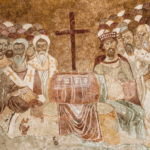Although we are capable of great acts of kindness, history teaches us that we sometimes need saving from ourselves—from our recklessness or our greed. God sent into the world a unique person—neither a philosopher nor a general, important though they are, but a Saviour, with the power to forgive.
(Queen Elizabeth II, Christmas message, 2011)
We thanked God for Queen Elizabeth over breakfast today.
We thanked God for Queen Elizabeth over breakfast today. We thanked him for her long life and faithful service. We thanked him that she acknowledged Jesus as her True King and that she has now received a rich welcome into his presence because of his death for her sins.
We also talked about the sadness of this moment. Earlier this week a friend was mourning the death of a family dog, recalling how he had been with her family through sickness and her children’s earliest years. Death is like that—even the death of animals. Things and people go away, and they take parts of our lives with them. The river bends and the current carries us on.
But the passing of the Queen feels like the passing away of a world. More than any other person, she embodied the entire twentieth century with all its vast changes and tumults. She connected us to the War, to Churchill, to the last days of an Empire, to an era where monarchy still seemed plausible.
Well, good riddance, some will say. Those things were all bad. Time for a republic.
And yet, even today, the instinct for monarchy is strong within us. As history catches up with the house of Windsor, millions tune in to fantasies of rightful kings and battles royale on Amazon Prime and HBO. Meanwhile Disney might make its damsels less helpless, but it can’t stop producing princesses.
“Why do so many people who routinely attack patriarchy and white supremacy give monarchy a pass?” asked New York Times editor, Farah Stockman last year.
Is it possible that people crave pomp and pine for leaders who embody grandeur? Leaders who live in fancy towers, full of gaudy gold stuff, perhaps? Leaders who are said to have been chosen by God?
Maybe it’s as simple as that. We crave glory; we crave an anointed king; we long for God to send someone who will rule with justice and righteousness.
Symbolic monarchy diverts hopes from actual demagogues.
If that’s right, one of the best arguments for a (mostly) powerless symbolic monarchy is that it diverts some of these hopes away from actual demagogues. The last ninety-six years have given us more than enough examples of what happens when people start to believe in real messiahs.
But of course, the ultimate answer is, as always, Jesus:
- the rightful heir who came forth from poverty to claim his crown;
- the champion who stooped and served when he had the right to conquer (Mark 10:42-45);
- the hero who never used his power to collect gold or mistresses, but made himself poor and spoke up for the shamed and despised (Luke 7:36-50 c.f. Matt 26:10-13);
- the good man who never had to sue, bully or pay off the press to conceal his scandals (John 18:19-21);
- the great King who defeated the enemy by his death, and now sits in glory waiting for his wedding day.
I am so grateful for the life of the Queen. I am thankful that I (and my children) got to live during the reign of one of history’s great monarchs. But I am infinitely more happy to know the True King who stands beyond the horizon of every pageant and fairytale.
And I am so glad that Elizabeth thought that way too.















